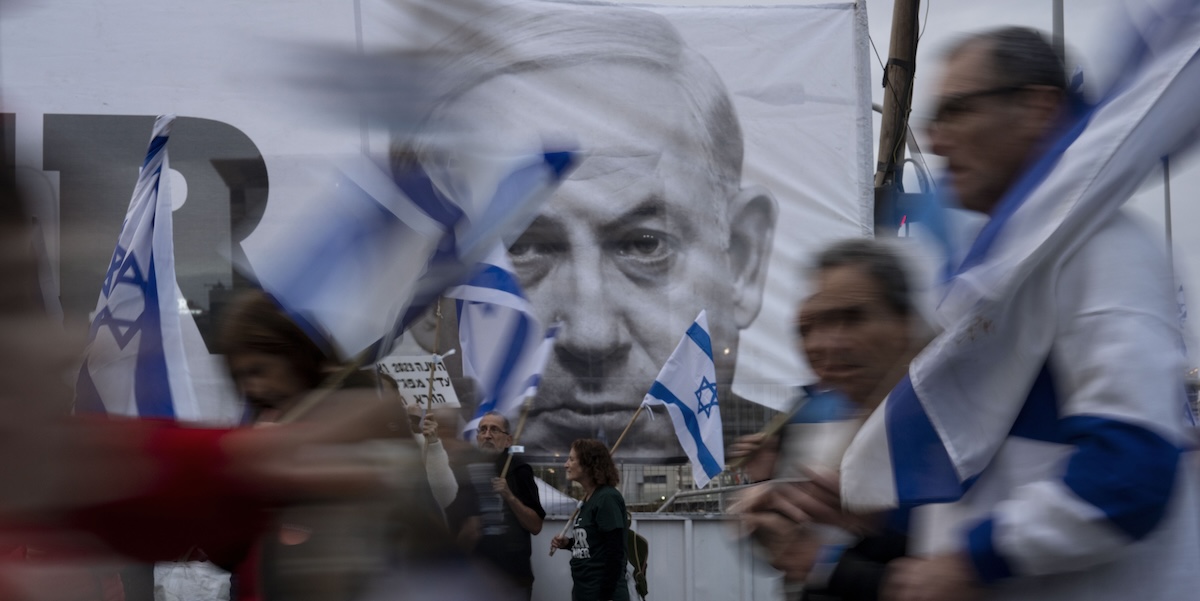The war in the Gaza Strip waged by Israel in response to the Hamas attack on October 7 has been going on for more than three months now, and there currently appear to be no signs of détente or a possible end in the short term. When he talks about it, Israeli Prime Minister Benjamin Netanyahu always says very convincingly that Israel has no intention of taking steps backwards until it has completely destroyed Hamas. Yet not everyone in the Israeli government thinks like him, and critical positions towards him have emerged for the first time in recent days.
It was done a few days ago by Gadi Eisenkot, former army chief of staff, who in October became part of the national unity government that was formed after the alliance between Netanyahu and former Defense Minister Benny Gantz , leader of one of the opposition parties (the centrist Blue and White). Eisenkot, who is part of Gantz’s party, is a minister without portfolio but is also a member of the war cabinet, the operational body that makes decisions regarding ongoing military operations in Gaza.
– Read also: South Africa’s case against Israel for genocide, explained
Eisenkot is 63 years old and has long military experience, and a month ago his son was killed by a bomb explosion during an operation in the Jabaliya refugee camp, in the north of the Gaza Strip. Thursday during an interview with the Israeli television channel It’s 12 he implicitly criticized Netanyahu’s strategy very harshly: «Whoever says that there has been a destruction of Hamas’ capabilities in the north of the strip is telling the truth. But anyone who talks about absolute defeat is not telling the truth. This is why we shouldn’t make up stories. Today the situation in the Gaza Strip is such that the objectives of the war have not yet been achieved.”
Gadi Eisenkot (ANSA/EPA/ABIR SULTAN)
When asked whether Israel’s current leadership is telling the truth to the Israeli population, Eisenkot simply replied “No.” He then added, again implicitly referring to Netanyahu, that he is not doing enough to discuss plans for Gaza’s future when the war ends. «You have to show leadership in the ability to tell the truth to people, in the ability to chart a path. […] You have to think about what happens next.” He also added that new elections should be held soon in Israel to assess whether voters still have faith in the current government. “It is necessary, within a few months, to bring Israeli voters back to the polls and hold elections to renew trust, because at the moment there is no trust.”
He then spoke about the situation of the approximately 130 hostages who are still held by Hamas in Gaza. In all, 240 people had been kidnapped: around half had been freed in exchange for the release of hundreds of Palestinian prisoners during a brief truce last November, but according to the Israeli government there are still at least 132 people held hostage and he estimates that 25 have died. Since November, Netanyahu has repeatedly said that there would not be a new truce and that Israel would not agree to make new agreements with Hamas for the release of the hostages.
According to Eisenkot, however, it is necessary to return to discussions with Hamas, because he believes it is impossible that the Israeli army can free the hostages in military operations inside Gaza. The hostages are likely being held in underground Hamas tunnels scattered across the Strip, and trying to free them by besieging the tunnels would likely result in their killing in the fighting, according to Eisenkot. “It is necessary to say, courageously, that it is not possible to return the hostages, alive, in the short term, without an agreement,” he said, criticizing “anyone who tries to sell fantasies to the public”. Eisenkot then concluded by saying that the only way forward at the moment is a new truce and a new agreement with Hamas. «For me there is no dilemma: for me the mission to save civilians comes before killing the enemy. The enemy can be killed later.”
At the moment there have been no reactions to Eisenkot’s words from other members of the Israeli government, nor from Netanyahu, who a few hours earlier on Thursday had held a press conference in which he had essentially said the opposite. He had rejected the idea of holding new elections before the victory against Hamas, and had also spoken about the future of the Gaza Strip in very different terms than Eisenkot. Among other things, he had ruled out the possibility of the creation of an autonomous Palestinian state in the Gaza Strip and the West Bank in the near future. “In any solution that may be found in the near future, with or without an agreement, Israel will retain control over all territories west of the Jordan River,” he said.
– Read also: There will be no Palestinian state after the end of the war in Gaza, according to Netanyahu
